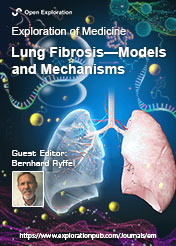-
Guest Editor
Prof. Bernhard Ryffel E-Mail
Professor, INEM, UMR7355, CNRS, University of Orleans, Orleans, France
Research Keywords: mechanisms of inflammation, innate immune danger sensing, inflammasome activation, IL-33 and Th17/Th22 differentiation
About the Special Issue
The lung is a critical organ for gas exchange and overall health. Chronic environmental exposures may cause injury to the respiratory barrier, leading to inflammation, emphysema, and progressive interstitial fibrosis, ultimately resulting in respiratory failure. This special issue will begin with an overview of human fibrotic diseases and then address the following key topics:
Aerosol and systemic exposure to particles, smoke, allergens, chemicals, ozone, radiation, as well as viral, bacterial, parasitic, and helminth infections.
Clinical perspectives on COPD, including rodent and in vitro models, and their predictive value for COPD.
Idiopathic pulmonary fibrosis (IPF) and preclinical models.
Molecular mechanisms of fibrosis progression and cell death pathways.
The role of TLR, inflammasomes, DNA sensing, and cross-talk between pathways.
Inflammaging, senescence, and autophagy.
Inflammatory cytokines such as TNF and IL-1 family members, and growth factors.
The contribution of intestinal microbiota and metabolism, including SCFA, tryptophan, and serotonin.
Prevention and therapy: new therapeutic targets and drug candidates.
Keywords: TNF, IL-1, growth factors, NLRP, TLR, autophagy, senescence, pollution, microbiome, metabolites, disease models
Call for Papers
Published Articles
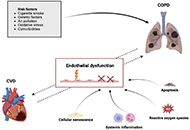 The role of pulmonary vascular endothelium in chronic obstructive pulmonary disease (COPD): Does endothelium play a role in the onset and progression of COPD?Open AccessReviewChronic obstructive pulmonary disease (COPD) is an inflammatory lung pathology characterized by persistent airflow limitation and is the third leading cause of death globally. COPD pathophysiology i [...] Read more.Silvia Siragusa ... Silvia PontisPublished: December 29, 2023 Explor Med. 2023;4:1116–1134
The role of pulmonary vascular endothelium in chronic obstructive pulmonary disease (COPD): Does endothelium play a role in the onset and progression of COPD?Open AccessReviewChronic obstructive pulmonary disease (COPD) is an inflammatory lung pathology characterized by persistent airflow limitation and is the third leading cause of death globally. COPD pathophysiology i [...] Read more.Silvia Siragusa ... Silvia PontisPublished: December 29, 2023 Explor Med. 2023;4:1116–1134
DOI: https://doi.org/10.37349/emed.2023.00199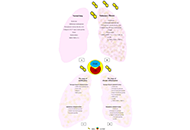 Mechanism of lungs fibrosis in mycobacterial infectionOpen AccessReviewLung tuberculosis (TB) remains a heavy burden on public health worldwide. This review discusses mainly the mechanisms of the development of pulmonary fibrosis in an experimental TB model in mice. Th [...] Read more.Lena B. Kim, Anna N. PutyatinaPublished: December 12, 2023 Explor Med. 2023;4:956–976
Mechanism of lungs fibrosis in mycobacterial infectionOpen AccessReviewLung tuberculosis (TB) remains a heavy burden on public health worldwide. This review discusses mainly the mechanisms of the development of pulmonary fibrosis in an experimental TB model in mice. Th [...] Read more.Lena B. Kim, Anna N. PutyatinaPublished: December 12, 2023 Explor Med. 2023;4:956–976
DOI: https://doi.org/10.37349/emed.2023.00187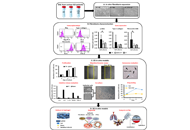 Utility of fibroblasts derived from broncho-alveolar lavage of patients with idiopathic pulmonary fibrosis or related disorders to develop in vitro modelsOpen AccessPerspectiveBroncho-alveolar lavage (BAL) represents a safe tool for the differential diagnosis of various pulmonary fibrotic diseases. Idiopathic pulmonary fibrosis (IPF) belongs to a heterogeneous group of di [...] Read more.Paolo Giannoni ... Daniela de ToteroPublished: August 31, 2023 Explor Med. 2023;4:461–470
Utility of fibroblasts derived from broncho-alveolar lavage of patients with idiopathic pulmonary fibrosis or related disorders to develop in vitro modelsOpen AccessPerspectiveBroncho-alveolar lavage (BAL) represents a safe tool for the differential diagnosis of various pulmonary fibrotic diseases. Idiopathic pulmonary fibrosis (IPF) belongs to a heterogeneous group of di [...] Read more.Paolo Giannoni ... Daniela de ToteroPublished: August 31, 2023 Explor Med. 2023;4:461–470
DOI: https://doi.org/10.37349/emed.2023.00156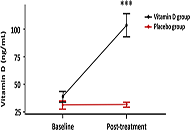 Mechanistic approaching study in COVID-19 patients treated with high doses of vitamin DOpen AccessOriginal ArticleAim: To evaluate angiotensin II (Ang II) and Ang-(1-7) levels and the cytokine profile in patients hospitalized with mild coronavirus disease 2019 (COVID-19) and contrast them with patients with identical clinical conditions but t [...] Read more.Mauro G. Silva ... Walter ManuchaPublished: April 26, 2023 Explor Med. 2023;4:246–253
Mechanistic approaching study in COVID-19 patients treated with high doses of vitamin DOpen AccessOriginal ArticleAim: To evaluate angiotensin II (Ang II) and Ang-(1-7) levels and the cytokine profile in patients hospitalized with mild coronavirus disease 2019 (COVID-19) and contrast them with patients with identical clinical conditions but t [...] Read more.Mauro G. Silva ... Walter ManuchaPublished: April 26, 2023 Explor Med. 2023;4:246–253
DOI: https://doi.org/10.37349/emed.2023.00137 -
-
Ongoing Special Issues
-
Completed Special Issues
